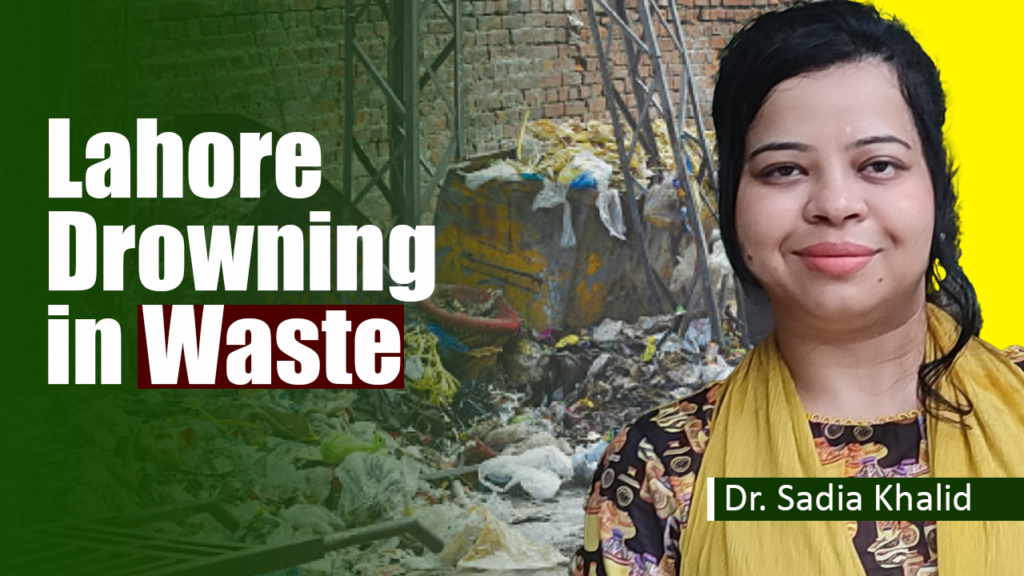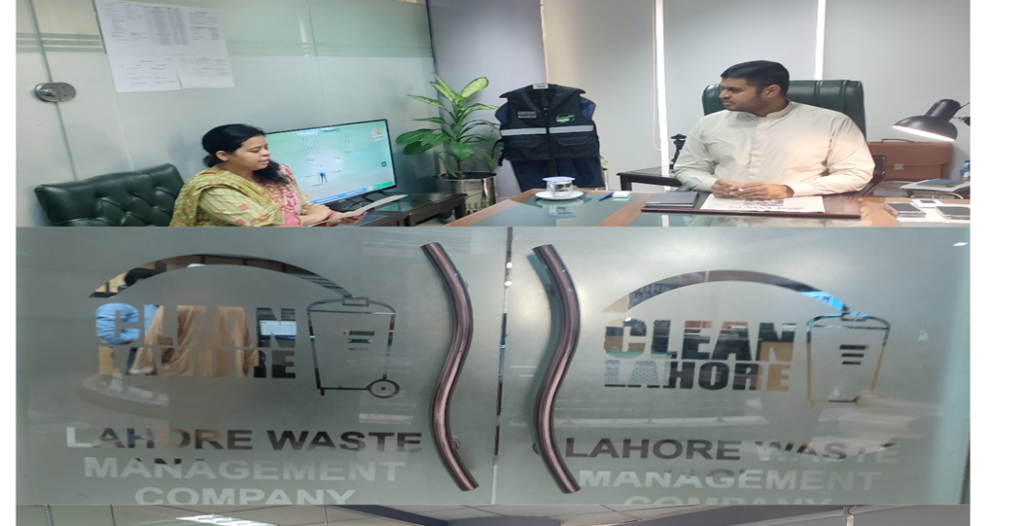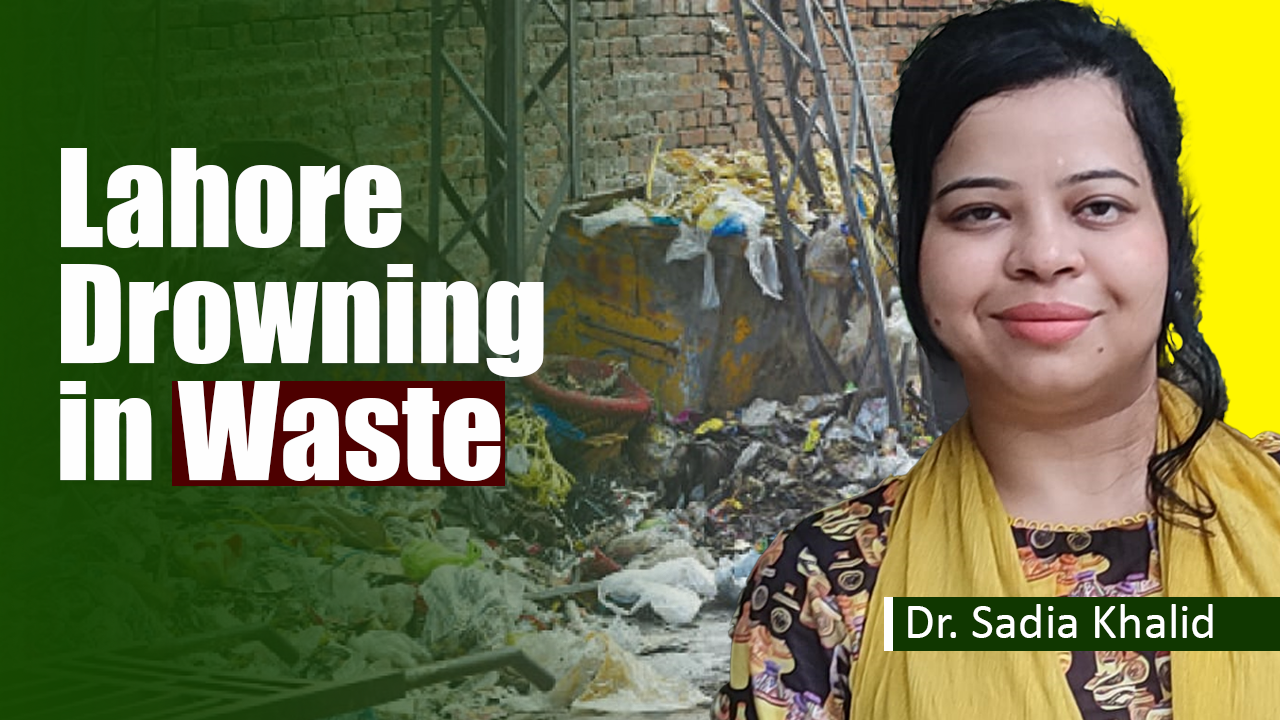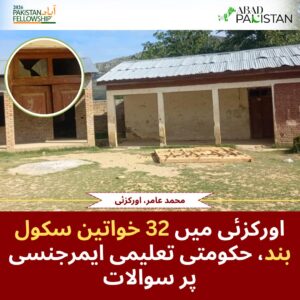(Written by: Dr. Sadia Khalid- Climate Activist from Lahore)

Effective household solid waste management is a major public health concern in our urban cities. Household solid waste management involves the entire process – from collection and transport to processing, recycling, disposal, and monitoring of waste materials. This systematic process is critical for maintaining a healthy and clean environment.
Household solid waste (HSW) can have a direct and indirect impact on our environment and health. Poor trash collection, poor disposal facilities, and waste mismanagement can all contribute to the spread of diseases such as malaria, typhoid, diarrhea, cholera, helminthiasis, and dysentery. Solid household waste also ruins natural beauty, affects the landscape, poses fire threats and bad odors, obstructs sewage lines, and degrades soil and land.
Ineffective solid waste management can be attributed to numerous factors. Major contributing factors include a lack of infrastructure, poor garbage collection systems, and a lack of public awareness. A lack of understanding regarding the sorting of waste, disposal techniques, and poor recycling hinders effective waste management. The lack of appropriate landfills and door-to-door collection services worsens this problem.
Many households engage in unsustainable practices such as dumping rubbish in their backyards, along streets, or burning it.
Lahore is a city of 14 million people. Before 2011, Lahore lacked a proper waste management system. The city had only one dumping site, Mahmood Booti, which had been operational since 1998. This 40-acre property reached capacity in April 2016 and was closed. It is believed to have received 13.14 million tons of garbage over its history, of which 55-60% is biodegradable.

(A open drainage filled with plastic waste at Maulana Shaukat Ali Road, Lahore)
The Lahore Waste Management Company (LWMC) was set up in 2011 to develop an integrated system for collecting, recovering, transporting, and processing solid waste in Lahore. The LWMC has now created the first proper landfill site in Pakistan, in Lakhodhair, capable of processing 35,000 tons of garbage.

Dr. Sadia Khalid interviewing Muhammad Aurangzeb (Deputy CEO-LWMC)
Waste collection in Lahore includes both primary and secondary collection. The Lahore Waste Management Company (LWMC) handles waste collection for more than 95% of the city. Primary collection is done by both formal and informal recycling, with door-to-door pickup. Usually, waste collectors collect waste from households using donkey carts. Secondary collection takes place at temporary dumpsites established in local areas. The combination of formal and informal collection methods contributes to an overall waste collection rate of 68% for the city of Lahore.
Lahore generates over 2 million tons of solid waste each year or approximately 6,000 tons per day. LWMC has acquired and deployed more than 900 new vehicles, including 530 mini-dumpers, 64 chain-arm roll trucks, and 47 rickshaw tippers. They have also installed 6,000 new waste containers throughout the city and deployed 3,000 handcarts for manual sweeping.
According to LWMC Deputy CEO Muhammad Aurangzeb, the company currently operates a fleet of 640 vehicles. According to Operation Manager Fahad Mehmood, LWMC collects approximately 4,700 tons of waste per day at the Lakhodair landfill site.
LWMC recently carried out a month-long “Suthra Punjab” cleanliness campaign on orders from the chief minister. During this, LWMC CEO Babar Sahib Din stated that they collected 130,000 tons of solid waste, including 25,000 tons from 400 open spaces. They also mechanically swept 16,000 km and washed 1,100 km of roads.
According to LWMC CEO Babar Sahib Din, 268 of Lahore’s 274 union councils have attained “zero waste status” due to our recent zero waste drive. He added that they additionally placed colorful trash containers and distributed cleanliness awareness brochures to urge individuals to properly dispose waste. He continued by saying that we also advised shop owners to dispose of their garbage in the designated bins, emphasizing that everyone’s participation is necessary to keep the city clean.

( Dumping of waste without segregation at Shouk Chowk Park, Lahore)
The Chief Minister, Maryam Nawaz Sharif, has directed LWMC to start a comprehensive cleanliness awareness campaign to reach every union council. Babar Sahib Din urged citizens to use LWMC’s helpline 1139 for waste-related complaints and cooperate in keeping Lahore clean. He also proudly said that LWMC would collect 45,000 tons of waste at the end of this month to reduce plastic in Lahore.

Many Lahore residents complain that the Lahore Waste Management Company (LWMC) is failing to keep the city clean, despite having significant resources.
“The LWMC sweepers only focus on the major roads, completely neglecting our local area,” says Naveed, a resident of Wafaqi Colony. “Despite our repeated complaints, the piles of waste along our streets remain untouched.”
Fatima, a homewife residing in Gulberg, says the lack of proper waste bins forces residents to dump trash on the streets, resulting in ugly piles of garbage.
Saleem, a shopkeeper in Old Anarkali, says food waste from our homes is not properly disposed of, leading to rot and foul odors.
Saira, a resident of Model Town, complains that most people do not bother to separate biodegradable items, and everything ends up in the landfill.
Imran, a parent living in Johar Town, says municipal workers collect waste without any safety measures and sometimes scatter litter all around the way especially pampers to dumping places.
Naveed, a Faisal Town resident, says private waste collection rickshaws illegally dump waste on the roads instead of proper disposal sites.
Amina, a schoolteacher, says the root of the problem is the casual, irresponsible attitudes of many residents towards proper garbage disposal.
Saleem, a resident of Canal Road, adds that busy schedules make it difficult to educate family members on effective waste segregation and recycling.
Imran stresses that people in his area carelessly dump trash anywhere, leaving piles of garbage on the streets. “The casual attitude of people towards managing their waste is a major issue contributing to the growing mess in our community,” he further added.
One of the waste pickers Ali stated that they lack proper training, gloves, and equipment to safely segregate waste, sometimes injuring their hands on glass or sharp objects.

(Colorful and Attractive Dustbins installed at points of the city)
To address the waste management challenges, the government and LWMC need to work with the community. Improvements to waste collection and promoting recycling could help. Making sustainable products more affordable and accessible is also important. Public awareness campaigns could encourage residents to be more responsible about disposing of waste properly. With efforts from everyone, Lahore can become a cleaner and greener city.
Must Read: سوشل میڈیا سیلبریٹیز کا طریقہ واردات یا میری غلط فہمی





